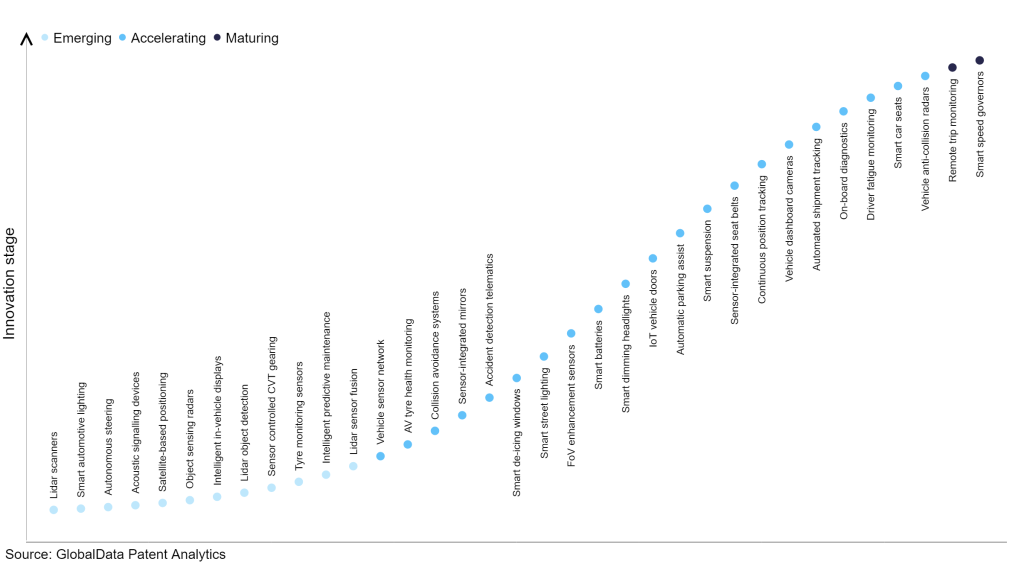The automotive industry continues to be a hotbed of patent innovation. Activity in smart batteries is driven by cost efficiency, predictive maintenance, energy efficiency, and longevity, and growing importance of technologies such as edge computing, battery management system (BMS), Internet of Things (IoT) connectivity, and machine learning. In the last three years alone, there have been over 1.7 million patents filed and granted in the automotive industry, according to GlobalData’s report on Internet of Things in automotive: smart batteries. Buy the report here.
However, not all innovations are equal and nor do they follow a constant upward trend. Instead, their evolution takes the form of an S-shaped curve that reflects their typical lifecycle from early emergence to accelerating adoption, before finally stabilizing and reaching maturity.
Identifying where a particular innovation is on this journey, especially those that are in the emerging and accelerating stages, is essential for understanding their current level of adoption and the likely future trajectory and impact they will have.
300+ innovations will shape the automotive industry
According to GlobalData’s Technology Foresights, which plots the S-curve for the automotive industry using innovation intensity models built on over one million patents, there are 300+ innovation areas that will shape the future of the industry.
Within the emerging innovation stage, LiDAR scanners, smart automotive lighting, and autonomous steering are disruptive technologies that are in the early stages of application and should be tracked closely. Vehicle sensor network, AV tire health monitoring, and collision avoidance systems are some of the accelerating innovation areas, where adoption has been steadily increasing. Among the maturing innovation areas are remote trip monitoring and smart speed governors, which are now well established in the industry.
Innovation S-curve for Internet of Things in the automotive industry

Smart batteries is a key innovation area in Internet of Things
Smart batteries refer to batteries that have integrated technology and intelligence to monitor and manage their own performance. These batteries are equipped with sensors, microcontrollers, and communication capabilities to collect and analyze data, enabling them to optimize their operation, monitor their health, and provide valuable information to users.
GlobalData’s analysis also uncovers the companies at the forefront of each innovation area and assesses the potential reach and impact of their patenting activity across different applications and geographies. According to GlobalData, there are 30+ companies, spanning technology vendors, established automotive companies, and up-and-coming start-ups engaged in the development and application of smart batteries.
Key players in smart batteries – a disruptive innovation in the automotive industry
‘Application diversity’ measures the number of applications identified for each patent. It broadly splits companies into either ‘niche’ or ‘diversified’ innovators.
‘Geographic reach’ refers to the number of countries each patent is registered in. It reflects the breadth of geographic application intended, ranging from ‘global’ to ‘local’.
Patent volumes related to smart batteries
Source: GlobalData Patent Analytics
LG is one of the leading patent filers in smart batteries. The company’s bidirectional inverters facilitate bidirectional energy flow, allowing smart batteries to discharge power back to the grid or share energy with other devices. It allows smart batteries to participate in grid services, supporting grid stability and demand response. Some other key patent filers in this space include Samsung SDI and Robert Bosch Stiftung.
In terms of application diversity, Cosmo Electronics leads the pack, while Honda Motor and Johnson & Johnson stood in the second and third positions, respectively. By means of geographic reach, Baxter International held the top position, followed by Cosmo Electronics and Guangdong Oppo Mobile Telecommunications.
To further understand the key themes and technologies disrupting the automotive industry, access GlobalData’s latest thematic research report on Internet of Things (IoT) in Automotive.
Premium Insights
From

The gold standard of business intelligence.
Blending expert knowledge with cutting-edge technology, GlobalData’s unrivalled proprietary data will enable you to decode what’s happening in your market. You can make better informed decisions and gain a future-proof advantage over your competitors.






